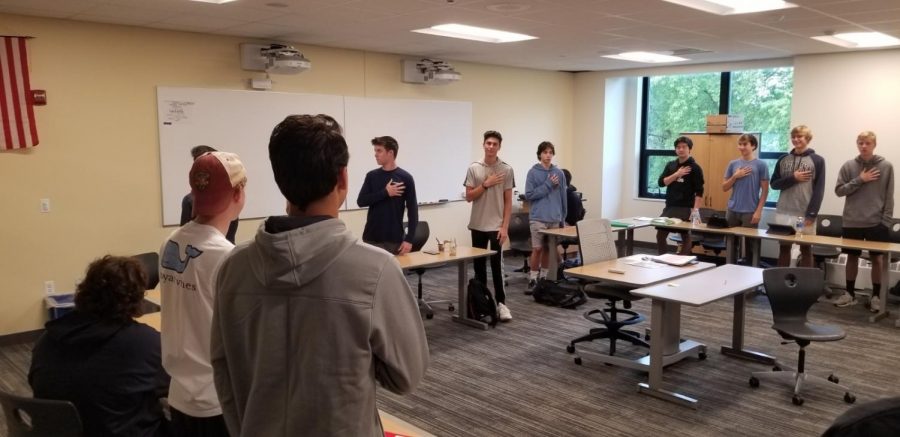Students and veterans debate importance of standing for the pledge
To stand or not to stand. That is the question
Standing for the Pledge of Allegiance in the United States is often seen as imperative to patriotism. However, in recent years, there has been public controversy surrounding people not standing for presentations of the American flag. During advisory, New Trier conducts the pledge through a loudspeaker that can be heard throughout the school. Students have the choice to stand or sit, but many question: Is standing for the pledge a requirement?
Social studies faculty and navy veteran Todd Maxman weighed in, encouraging students to discover the meaning of the flag.
“As a social studies teacher, I may be bothered by the fact that one hasn’t thought through it, but I want to be respectful of all different choices. I have students in my advisory who aren’t U.S. citizens. Should they have to say the pledge? I don’t think so. Should they have to stand for it? That’s a different question. There are lots of different reasons why people do or don’t and it is interesting we’ve attached [the flag] to respect for veterans. It’s a different thing. It’s a set of ideals and those ideals that drive this country are about free expression. And so, blind allegiance to a symbol is not what this country is about. It’s not why I fought and it’s not any part of the reasons why I gave five years of my life for.”
Similarly, senior Briana Hinrichs admits that students not standing for the pledge doesn’t bother her, but adds a different perspective.
“Many people are not one hundred percent American at New Trier and their culture may interfere with the pledge.” Hinrichs adds that coming from a German family, her parents taught her that if she disagreed with the actions of the government, she did not have to stand.
Countering Hinrichs, junior Kenny Dolin offers his perspective of how standing correlates with his appreciation for his country.
“Although I feel it’s a little disrespectful [to not stand], if that is one’s choice, then they shouldn’t be forced to stand if they don’t feel it’s the right thing to do. Currently, there is no law requiring it and [not standing] is one way of protest that students have. Personally, I stand for the flag because it is a way to show my appreciation to my country and for everyone who has fought for it. It doesn’t bother me because everyone is entitled to their own opinion.”
Junior Nylah Jones explained she chooses not to stand because she doesn’t agree with the government’s equity.
“Personally, I don’t stand for the flag and it doesn’t bother me for those who do. I don’t stand because I don’t believe in all the flag stands for and support its inequity. However, I will not bash someone who does stand for it.”
Campus security and former military veteran Johnyell Owens added that standing or not standing has nothing to do with being patriotic or respectful, rather it’s the actions that define American character.
‘Blind allegiance to a symbol is not what this country is about. It’s not why I fought .’
“It’s not a matter of patriotism, it’s ‘I’m patriotic’ because I spend time with the homeless. That doesn’t make you a better person because you stand up for the flag, it makes you a better American if you do what’s right. You challenge the challengers,”
Owens Added, “You put in work to help people in society, to build things, to be successful in life. That’s the American dream.”
For many New Trier students, standing or sitting for the pledge is a matter of conviction and interpretation.
At the end of the day, what we do for society seems to be the determining factor of Americanism and patriotism more than whether one stands for the pledge.
Owens said “It doesn’t make you more American because you stand up for the flag and cross your heart and then disrespect your teachers.”







































